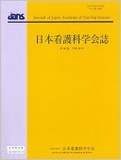Japanese
English
- 販売していません
- Abstract 文献概要
- 参考文献 Reference
要旨
目的:慢性心不全患者への遠隔看護介入モデルが入院リスクの軽減,QOLの維持・向上に有用であるかを検証する.
方法:入院を繰り返す65歳以上の慢性心不全患者11名にビデオ通話による看護介入を1年間実践し,介入前・中・後の入院回数と入院期間,体重,血圧,BNP値と,介入前後のQOLの比較・検討を行う.
結果:介入1回あたりの平均通話時間は11.5±3.6分で,介入前の入院回数は全員が2〜5回/年だったが,介入中は9名が入院することなく,そのうち5名は介入後の1年間も入院しなかった.BNP値等の数値に目立つ変化はなく,介入後のSF-36®による心理的側面の得点が有意に高かった.
考察:患者に合わせた短時間の集約的な介入の継続によってQOLを改善し入院を回避できたという結果から,遠隔看護介入モデルの有用性が確認できた.介入終了後も入院回避しており,在宅患者のセルフモニタリング能力の強化に繋がることが示唆された.
Purpose: This study aims to propose a telenursing intervention model for assisting the selfmonitoring of elderly patients with chronic heart failure and ascertain its efficacy in lowering the risk for hospitalization and the maintenance and improvement of patients' quality of life (QOL).
Methods: Nursing intervention was provided through video calls for one year to patients aged ≥65 years with chronic heart failure who had frequently been hospitalized. The following items were compared and investigated: patients' number and duration of hospitalization before, during, and after the intervention along with their weight, blood pressure, brain natriuretic peptide (BNP) values, and QOL.
Results: Video call nursing intervention was provided to 11 patients. The mean length of calls was 11.5 ± 3.6 min/session. Patients were hospitalized two to five times a year before the intervention, but nine were not hospitalized even once during the intervention period; of these, five were never hospitalized during the year following the completion of the intervention. No apparent changes were observed in parameters such as the BNP value; however, the scores for the psychological questions of the SF-36® used to assess post-intervention QOL were significantly higher.
Conclusion: This study confirms the efficacy of the telenursing intervention model for giving successive sessions of rapid and intensive intervention, customized for each patient to enhance their QOL and prevent hospitalizations. The preventive impact on hospitalization continued to last after the completion of the intervention period, suggesting that it effectively contributed to strengthening the self-monitoring abilities of patients living in their homes.
Copyright © 2018, Japan Academy of Nursing Science. All rights reserved.


